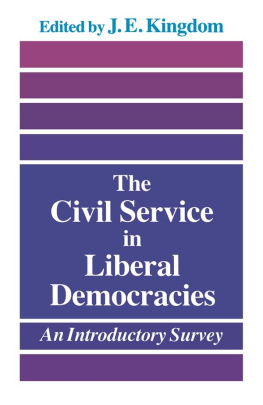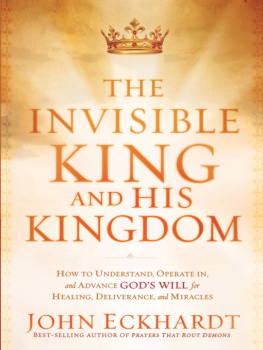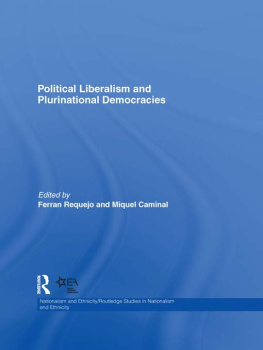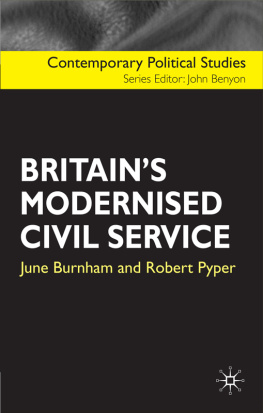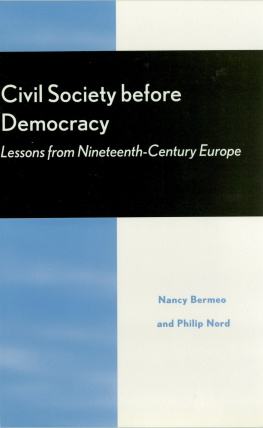THE CIVIL SERVICE IN LIBERAL DEMOCRACIES
The
Civil Service
in
Liberal
Democracies
An Introductory Survey
EDITED BY J.E. KINGDOM
First published 1990
by Routledge
2 Park Square, Milton Park, Abingdon, Oxon, OX14 4RN
Simultaneously published in the USA and Canada
by Routledge
a division of Routledge, Chapman and Hall, Inc.
29 West 35th Street, New York, NY 10001
Transferred to Digital Printing 2004
1990 J.E. Kingdom
All rights reserved. No part of this book may be reprinted or reproduced or utilized in any form or by any electronic, mechanical, or other means, now known or hereafter invented, including photocopying and recording, or in any information storage or retrieval system, without permission in writing from the publishers.
British Library Cataloguing in Publication Data
The civil service in liberal democracies: an
introductory survey.
1. Western world. Civil service
I. Kingdom, J.E. (John E. 1939-)
351.0009812
ISBN 0-415-00493-4
0-415-04456-1 (pbk)
Library of Congress Cataloging in Publication Data
The Civil service in liberal democracies: an introductory survey/
edited by J.E. Kingdom.
p. cm.
Includes index.
ISBN 0-415-00493-4. ISBN 0-415-04456-1 (pbk.)
1. Civil service Europe Case studies. I. Kingdom, J.E., 1939
JN94.A67C58 1989
351.6094dc20 89-10338
CIP
CONTENTS
J. E. Kingdom
J. E. Kingdom
J. E. Kingdom
B. G. Owen
M. McManus
R. E. Spence
B. M. Jones
J. A. Chandler
A. R. Peters
One problem encountered by students of public administration and politics is that their introduction to the subject area is based entirely on the case of a single country. This ethnocentric approach has a severe drawback in that it tends to limit students' perspectives, leaving them unaware of alternative institutional frameworks, practices, and ethical norms, and thereby reducing their capacity to understand any particular country. Ideally students should be made aware that each case represents but one, culture-bound example belonging to a much wider empirical domain.
While it is possible for students studying at an introductory level to turn to books devoted to particular countries, or to books of comparative study per se , they will experience problems of access posed by the quantity of the material and of complexity in methodology. For this reason there is a tendency for the comparative dimension to be ignored in courses at the level of GCSE, A-level, BTEC Ordinary and Higher Certificates and Diplomas. This book is intended to provide an opportunity for such students to gain some rudimentary knowledge of other systems of government. Although it does not aim to apply comparative methodology in the strict sense (that is, it does not postulate generalised hypotheses to be tested across a wide empirical domain), an attempt is made to isolate for examination a number of foci which together can constitute a framework for some simple comparison by students.
In the country-based chapters which follow each author has endeavoured to follow a common basic pattern, though each had complete freedom to diverge following his own individual perceptions and judgements concerning the salient features of the particular country.
The authors are grateful to Brenda Christmas for undertaking the exacting task of preparing the cameraready copy.
J. E. Kingdom
CIVIL SERVICES AS A SUBJECT FOR COMPARISON
Comparison must proceed upon the identification of a framework of similarity in the objects being compared. In the area of government and public administration it is common to seek such similarities in structures and/or functions. Prima facie , the study of civil services is unambiguously structural rather than functional. However, the notion of function remains present since the underlying rationale of the structures is essentially functional.
Civil services provide an obvious focus for comparative study for reasons such as the following. As well-established structures they are highly visible, and their formal function is very clearly defined. In addition, their role and organisation lie at the centre of a number of important debates which transcend national boundaries, relating for example, to efficiency, the distribution of power within the state, the role of the state in society, and the operation of democracy.
In principle, civil services are agents of governments; they are established to fulfil the function of rule implementation, the rules being, for the most part, the policies of the state. However, in reality it is not possible to discern a perfect identification of structure with function; civil services are not mono-functional, they do not merely implement policies; neither is the function of implementation their sole preserve. Inmost modern states the latter function is dispersed among a range of agencies, including institutions of local government, various ad hoc bodies, and nationalised industries. The greater the amount of public administration carried out by such semi-autonomous agencies of the state, the more important it becomes to focus attention, not on the function of implementation, but on the role of the civil service in policy-making, control and regulation.
The Concept of Bureaucracy
Civil services are characteristically organised as bureaucracies; indeed, the terms are almost synonymous. The strict meaning of bureaucracy is government by officials, or members of bureaux, and as such it carries decidedly pejorative connotations. However, following the extensive organisation studies of the sociologist Max Weber, it is common for social scientists to employ the term to denote a certain kind of organisation. Weber outlined his view of the ethical purpose of bureaucracy through his depiction of an ideal type of organisation form. This was a prescriptive model, the adoption of which would afford a protection against the dangers of arbitrary rule by officials in an increasingly complex modern state. It was characterised by rationality, impersonality, formal rules of procedure, and a centralisaton of authority.
The Concept of the Civil Service
The term civil service has a British ring, and derives from that part of the East India Company through which sovereignty in colonial India was exercised, the Indian Civil Service. This was seen as a particularly effective form of organisation for public administration. Many of its admired practices were used as an example for the nineteenth-century reform of the central administration of the mother country, and the term Home Civil Service gained acceptance. Civil servants of the Crown could be distinguished from other servants of the Crown such as politicians, the military, and the judiciary (Hughes 1954: 17)
In 1854 the Northcotte-Trevelyan report carried an official seal of approval for the term in its very title: Report on the Organisation of the Permanent Civil Service . From here it was given statutory endorsement in America when, in 1883, as part of the reform movement, the government established the United States Civil Service Commission. Various other countries have adopted this nomenclature to designate that part of the bureaucracy where recruitment lies outside the political process.
The term received a definitive enunciation in 1931 by a British Royal Commission, the Tomlin Commission:


